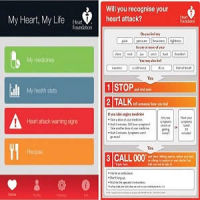An initial mHealth diagnostic strategy was associated with a shorter time to definitive therapy among patients with structural heart disease in a resource-limited area and was associated with improved outcomes, according to a randomised trial published in the journal JACC: Cardiovascular Imaging.
"These data have important implications for the use of pocket echocardiography and smartphone-connected mHealth devices at the point of care as clinical decision support tools in the healthcare system of resource-limited areas," study authors note.
Recent shifts in the global burden of cardiovascular diseases have led to an increasing prevalence in resource-limited areas with more than 25 million deaths in these regions predicted by 2030. This problem is further compounded with resource-limited areas receiving a disproportionately low allocation of global resources ranging from the availability of appropriate diagnostic tests to sufficiently trained healthcare professionals.
While newly developed smartphone-connected mHealth devices represent promising methods to diagnose common diseases in resource-poor settings, the impact of technology-based care on long-term outcomes has not been rigorously evaluated. The present study aimed to compare the outcomes of mHealth with smartphone-connected devices and pocket-echocardiography on medical decision-making among patients with rheumatic and structural heart disease (SHD) in a healthcare system of a resource-limited area.
A total of 253 patients with SHD were randomised to an initial diagnostic assessment with wireless devices in mHealth clinics (n = 139) or to standard-care (n = 114) in India. mHealth clinics were equipped with point-of-care devices including pocket-echocardiography, smartphone-connected-electrocardiogram blood pressure and oxygen measurements, activity monitoring, and portable brain natriuretic peptide laboratory testing. All subjects underwent comprehensive transthoracic echocardiography to assess the severity of SHD. The primary endpoint was the time to referral for therapy with percutaneous valvuloplasty or surgical valve replacement. Secondary endpoints included the probability of a cardiovascular hospitalisation and/or death over one year.
Key findings of the study include:
- An initial mHealth assessment was associated with a shorter time to referral for valvuloplasty and/or valve replacement (83 ± 79 days vs. 180 ± 101 days; p <0.001) and was associated with an increased probability for valvuloplasty/valve replacement compared to standard-care (34% vs. 32%; adjusted hazard ratio: 1.54; 95% CI: 0.96 to 2.47; p = 0.07).
- Patients randomised to mHealth were associated with a lower risk of a hospitalisation and/or death on follow-up (15% vs. 28%, adjusted hazard ratio: 0.41; 95% CI: 0.21 to 0.83; p = 0.013).
The study is the first to compare the impact mHealth device assessments such as pocket echocardiography and smartphone electrocardiography to the standard of care on treatment rates and outcomes among patients with advanced SHD in the health system of a developing nation, according to the authors.
"Integrating mHealth findings into existing health information technology systems and using diagnostic information provided by mHealth to improve risk stratification are among the important heuristic factors that can improve patient outcomes," the authors write. "New integration methods should remain a focus of future studies evaluating the outcomes of technology-enabled care in resource-limited areas."
Source: JACC: Cardiovascular Imaging
Image Credit: Pixabay
References:
Bhavnani SP et al. for the ASEF-VALUES Investigators (2018) A Randomized Trial of Pocket-Echocardiography Integrated Mobile Health Device Assessments in Modern Structural Heart Disease Clinics. J Am Coll Cardiol Img April 2018;11:546–57 https://doi.org/10.1016/j.jcmg.2017.06.019
Latest Articles
mhealth, structural heart disease, pocket echocardiography, smartphone electrocardiography
An initial mHealth diagnostic strategy was associated with a shorter time to definitive therapy among patients with structural heart disease in a resource-limited area and was associated with improved outcomes, according to a randomised trial published i

























